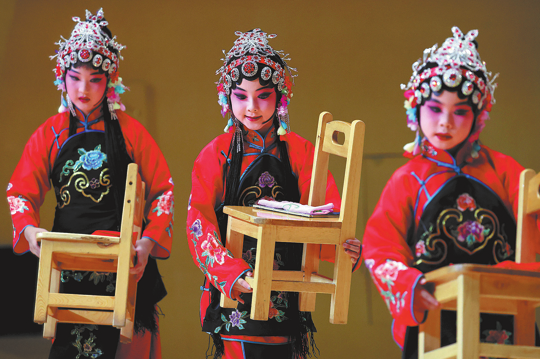Big city official points to future

Chongqing will accelerate its effort to become a global aviation hub that hosts 100 international airlines by 2020-adding "wings" to the inland city-according to Wu Cunrong, the city's executive deputy mayor.
Wu, who is also a delegate to the 19th National Congress of Communist Party China, said Chongqing aims to be a leading port, the high ground for the opening up of the country's inland region.
Wu said the municipality will work for rapid, sustained and healthy development under the guidance of CPC Central Committee General Secretary Xi Jinping's "Thought on Socialism with Chinese Characteristics for a New Era", and fully translate into reality Xi's instructions given during a visit to the city last year.
"Chongqing will establish a moderately well-off society and become an economic center in the Yangtze River's upper reaches, as well as a major modern manufacturing base," Wu said.
To fulfill Xi's vision, Chongqing will gear up as an inland port and accelerate the formation of an opening-up system that coordinates with international rules and laws. It will also accelerate the development of its pilot free trade area, promote the China-Singapore Chongqing Connectivity Initiative and encourage institutional innovation in such areas as investment and trade facilitation and government services, Wu said.
Also, Chongqing will explore the use of international railway supply chains and cross-border highways, and create a law-based, internationalized and enabling climate for investors. It will further boost the capacity and efficiency of the Chongqing-Xinjiang-Europe regular cargo rail and make it a signature route connecting Asia and Europe.
Cargo will be increased in both directions, cargo sources will be optimized, values per container will rise and two to three train services will be offered daily, Wu said.
Also, Chongqing will enhance the Chongqing-Guangxi-Singapore sea-to-rail route to offer western China a new southward access to the sea, he added.
Chongqing will be a point that hosts a high-speed rail network connecting western China to key river deltas in the country and in Southeast Asia, according to Wu.
In the waterways, Chongqing will further facilitate commodity trade between the Yangtze region and countries along routes of the Belt and Road Initiative, he said.
- Tibetan large language foundation model launched in Lhasa
- Macaque survives over a year after pig kidney transplant in China
- Chinese scientists develop broad-spectrum nanobodies for tick fever treatment
- Senior CPC official attends meeting on Beijing's planning, construction
- Over 50 new foreign academicians elected to China's top academic institutions
- Retailer lauded for 'moral-damage' compensation




































